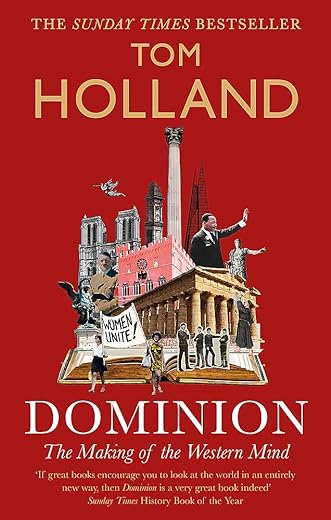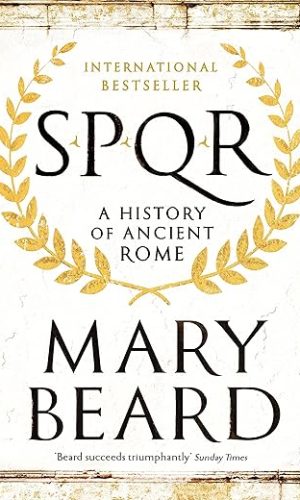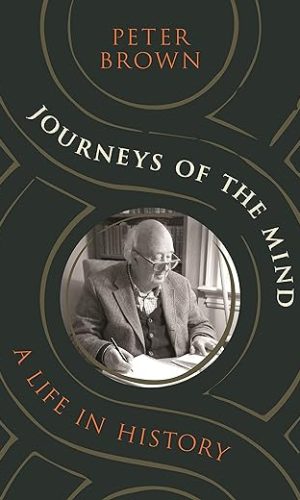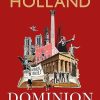Dominion: The Making of the Western Mind
£6.20£12.30 (-50%)
‘If great books encourage you to look at the world in an entirely new way, then Dominion is a very great book indeed . . . Written with terrific learning, enthusiasm and good humour, Holland’s book is not just supremely provocative, but often very funny’ Sunday Times History Book of the Year
Christianity is the most enduring and influential legacy of the ancient world, and its emergence the single most transformative development in Western history. Even the increasing number in the West today who have abandoned the faith of their forebears, and dismiss all religion as pointless superstition, remain recognisably its heirs. Seen close-up, the division between a sceptic and a believer may seem unbridgeable. Widen the focus, though, and Christianity’s enduring impact upon the West can be seen in the emergence of much that has traditionally been cast as its nemesis: in science, in secularism, and yes, even in atheism.
That is why Dominion will place the story of how we came to be what we are, and how we think the way that we do, in the broadest historical context. Ranging in time from the Persian invasion of Greece in 480 BC to the on-going migration crisis in Europe today, and from Nebuchadnezzar to the Beatles, it will explore just what it was that made Christianity so revolutionary and disruptive; how completely it came to saturate the mind-set of Latin Christendom; and why, in a West that has become increasingly doubtful of religion’s claims, so many of its instincts remain irredeemably Christian. The aim is twofold: to make the reader appreciate just how novel and uncanny were Christian teachings when they first appeared in the world; and to make ourselves, and all that we take for granted, appear similarly strange in consequence. We stand at the end-point of an extraordinary transformation in the understanding of what it is to be human: one that can only be fully appreciated by tracing the arc of its parabola over millennia.
Read more
Additional information
| Publisher | Abacus (6 Aug. 2020) |
|---|---|
| Language | English |
| Paperback | 624 pages |
| ISBN-10 | 0349141207 |
| ISBN-13 | 978-0349141206 |
| Dimensions | 12.6 x 4.2 x 20.2 cm |






by DaveT
Really interesting how Tom Holland details the rise of Christianity from a relatively minor religion to an international faith. The adoption of Christianity by the Roman emperor Constantine facilitated the dissemination throughout the Latin world and the vastness of the empire meant that this was inclusive of many peoples. Further down the line the British empire would similarly act as a vehicle for an analogus dissemination. There were downsides too, as the Crusades amply demonstrated, with Crusader Knights putting to sword those they conquered, often with Papal approval. Alongside this were the inquisition which put to death many accused of heresy, seemingly at the whim of Church authorities. In balance to these negatives, there were many instances of truly magnificent people who shed life’s pleasures and comfort and devoted themselves to spreading the word of God. Some of these were aristocrats and some were canonized afterwards. It was also interesting to learn.of the Reformation, precipitated by Martin Luther, and which consequently caused the morphing of different communities’ beliefs into Protestantism. Calvinism was stemmed from this ideology. A further point of interest was how the Jewish community in Prussia modified their identification with a Jewish nation to that of Jewishness as a religion a fact which was enforced upon them by Prussan regulations. Tom Holland succeeds in demonstrating how as Christianity spread, the principles and tenets were adopted by those converted, thus shaping their religious viewpoint. The account is a balanced one and Christianity’s positives and negatives are taken note of.
by PETER C
This book takes you on a high speed jaunt through the last two thousand years of Western history with plenty of interesting stories to support Tom Holland’s argument that Christianity has been fundamental in shaping the way we think today whether we are actually Christians or not. It is an argument that doesn’t seem too controversial once it is pointed out, but it does indeed need to be pointed out and some of the implications, as discussed in the book, are fascinating if for no other reason than that they make evident that what we might take for granted are not as axiomatic as we might assume.
However, if you are well versed in the history of Christian history and scripture, you may find that you are familiar with a significant amount of the content although I doubt that there will be many readers who will have encountered every story or vignette presented. Similarly, there will be others who are already very well versed in the arguments concerning the influence of Christianity that may also find this book lightweight in terms of how Tom Holland defends his thesis. Certainly those readers who are already predisposed against Christianity will and indeed have been particularly critical on this score. However, Christians might also have their own criticisms of this book. It should be read as an enjoyable introduction to both Christian history and a challenge to reflect on why we think the way we do – a challenge that is all the more interesting knowing that Holland himself had previously thought that our values owed more to pre-Christian classical values than Christian ones and all the more poignant when we consider how part of his reflection occurred whilst walking through a ruined town in Syria only lately liberated from Islamic State fighters who had been crucifying and taking slaves.
The book runs as a story through time and this chronological format does help the flow of the book but I do wonder whether a format based on themes might have brought greater clarity to the main argument (i.e. Christian influence) which does sometimes get lost in the story. It is particularly strong at the beginning, where Tom Holland plays to his strength as a historian with a strong knowledge of the classical period ( I enjoyed his discussion about ancient Persian civilization). It does weaken in later chapters, although discussion concerning the influence of Nietzsche and Darwin upon the Nazis and other aspects of modern history is well done and does highlight differences with Christian philosophy. However, I think Holland could have looked to more contemporary non-Christian cultures to highlight differences. For example, he mentions Hinduism and the practice of sati in the context of how secularism was introduced to India. But what about other differences? And why was sati accepted in India and not in Christianity? As Charles Napier is famously quoted “my nation has also a custom. When men burn women alive we hang them”. Yet critics of Holland’s argument could also point non-Christian cultures and identify many more similarities in culture and thought that they enjoy with the West. So is Christianity really so important? Even St Paul might join the critics to some extent – whilst Holland quotes him in Romans 2:15 – “God’s law is written in their hearts” as something as a theme that leads to departure from scripture and religious laws, most interpretations rather see this as Paul explaining that right and wrong have always been discernible to some extent by nature – hence the emphasis on natural law moral philosophy within the Catholic Church. In this way, both Catholics and atheists might together critique Holland and perhaps mischievously suggest that he is being influenced by his own Protestant background? Indeed, his characterisation of St Paul does seem to be questionable in some areas and it is surprising that we hear more of Paul rather than of Christ himself even if Paul was a key transmitter of the Christian message. Holland’s emphasis on Paul isn’t the only contentious area that he presents without reference to the fact that his interpretation might be disputed – his dismissal of the Catharism as something of a non-philosophy is actually very controversial historically. Ironically, were Holland to have adhered to the established opinion that it was a real challenge, it would have provided fertile ground for investigation how different ideas could have been embedded in Western thought had they been successful.
The personal reflection from Holland at the end, especially regarding his own godmother was worthwhile. Indeed, it could have been expanded to explain how Holland feels about the way he thinks as a non-Christian and how he reconciles that with the work of Nietzsche that he himself has commented on. Clearly Holland is precisely the type of thinker that he describes Nietzsche holding in such contempt – i.e. a non believer who respects Christian philosophy. What would Holland say to Nietzsche? His godmother would not have had a problem answering; I am not sure about Holland. Would he overcome his fairly superficial childhood objections to religion based on dinosaurs and join his godmother? or would he simply shrug his shoulders, agree with Nietzsche, but accept that he is a slave to to his Christian culture?
A good book. You are likely to find areas of weakness and aspects to criticise. But if you are open minded and not already an expert, it should be an enjoyable and worthwhile read. I would certainly recommend it.
by Paul
Tom Holland’s Dominion is my book of 2019. It is an epic masterpiece of storytelling and scholarship which gives an objective picture of the Christian contribution to the development of how we view the world. Every page contains thought provoking ideas. The author has a rare gift for narrative and a lively sense of drama with his message delivered directly through the lives of Christians as much as via complex theological debates.
Dominion’s central thesis is that the western mind has been a creation of Christian values. Without Christianity there would be no modern secular civilisation either. Holland after twenty years of reading about classical antiquity recognised what a rupture Christianity created from the pagan culture. Caesar killed a million Gauls and enslaved a million more. Spartan warriors such as Leonidas whose people practiced eugenics and trained their children to kill undermenchen.
Holland was repulsed by the idea that the poor or weak might not have any intrinsic value in the ancient world. There was an absence of humility and brotherly love in Aristotle. Altruism was not much prized in pre-Christian times. Stoics were encouraged to perform public duties and Epicureans instructed people how to be happy, but acts of self-sacrifice to help suffering were not recognised by morality or especially admired.
The Christian story tells of the son of God being put to death on the cross. In the Roman world this was the fate of criminals and those who challenged imperial power. Christianity brought with it a moral revolution. The powerless came to be seen a God’s children and therefore deserving of respect as much as the highest in society. God was on the side of the weak. The first shall be last and the last first. All human beings were equal in the sight of God. If all men were equally redeemed by Christ and equally beloved of God, then there would no hierarchies or rank. For Paul, God does not show favouritism.
Holland gives thoughtful treatment to Christian progressive values over a wide range of moral questions. Gregory of Nyssa defined the institution of slavery as an unpardonable offence against God at a time when most Christians and others took it for granted. Human nature he believed had been created free. To Gregory to own slaves was to set one’s power above God. During the Spanish Conquest of the New world Cortes kept Indians in cruel conditions. Bartolome de Las Casas found himself born again. He freed his slaves, never doubting that his convictions came from mainstream Christian teaching. Formulating his objection to Spanish imperialism he drew on the work of Aquinas. The Quakers Benjamín and Sarah Lay were both hunchbacks barely four feet tall. They were fearless in confronting the slave owners of Barbados begging the slave-owners to examine their hearts
Thomas Cajetan appointed head of the Dominicans was shocked to think that a Christian ruler should think to justify conquest and savagery in the name of a crucified Christ. For Cajetan, the teachings of the Church were universal in their reach; Christianity should be imposed not by force but solely by persuasion; that neither kings nor emperors nor the Church itself had any right to ordain their conquest. Here, in Cajetan’s opinion “ were the principles fit to govern a globalised age.”
Holland gives a moving account of the role played by Christians in fighting racism and segregation in the US. Lynch mobs’, lawmen and increasing recruits to the Ku Klux Klan created a hostile environment across the US. Holland highlights the pivotal role of Martin Luther King, a southern pastor a magnificent orator and organiser who sought the peaceful route to challenge discriminatory actions and legislation. King asked: “was not Jesus an extremist for love?” King drew on Paul for inspiration: “to talk of love as a thing greater than prophesy or knowledge or faith. This had become a revolutionary act.
Desmond Tutu as Anglican Bishop of Cape Town decried apartheid as “totally unchristian evil and a heresy” a position echoed by the Anglican church. Holland points out that Africaaner Churchmen had incorrectly interpreted Calvin’s position as potentially lending support to apartheid. Calvin’s stance was one that would have regarded apartheid as a usurpation. When clergymen both black and white quoting the Africaaners most admired clergyman, that no possible backing for racial segregation was to be found in his writings but just the opposite, a hammer blow was dealt to the apartheid regime. Nelson Mandela a committed Methodist had thoroughly read his Bible in his prison cell. He had resolved to forgive Quoting Matthew: “you have heard that it was said love your neighbour and hate your enemy, but I tell you love your enemies and pray for those who persecute you, that you may be sons of your Father in heaven” FW de Klerk resolved to set Mandela free. He was freed in 1990 and became the first black President in 1994.
Holland explores the somewhat ambivalent treatment given by Christians on gender issues. The progressive Christian message that it was unacceptable to discriminate on the basis of colour raises the question of gay and homosexual relations. Here Holland seeks to prick the consciences of evangelicals.. To many feminists and advocates of gay rights, Christianity seemed the opponent representing bigotry, injustice and persecution. Social conservatives would claim that they had two thousand years of Christian tradition behind them, but so too did liberals. Holland, citing King “there is no graded scale of essential worth”. He writes “Every human being has etched in his personality the indelible stamp of the creator. Every man must be respected because God loves him”. Every woman too, a feminist would have added. If everyone shares an inherent worth, there should be no discrimination on the grounds of gender or sexuality. Krafft- Ebing , German scientist raised a Catholic he took for granted the primacy of Christian marriage as a lifelong institution He stated that “Christianity raised the union of the sexes to a sublime position by making woman socially the equal of man and by elevating the bond of love to a moral and religious institution. Krafft-Ebing at the end of his career believed that sodomy should be decriminalised. Homosexuals might be no less familiar with “the noblest inspirations of the heart” than any married couple. Krafft-Ebing rather than condemning sodomy saw Christianity’s great contribution to civilisation: lifelong monogamy. Holland concludes; “homosexuality ,as defined by the first scientist ever to attempt a detailed categorisation of it, constituted the seamless union of Christian sin with Christian love”
Dominion is full of martyrs and saints who bear testimony to the power of the Christian message to inspire love of one’s fellow man and woman, including charitable and selfless acts. Paul willingly put this manifesto into practice by abandoning his privileges, including the rights of Roman citizenship. We are told of Emperor Julian providing an embryonic social welfare state in 362 building on the earlier examples of Basil and Gregory who devoted their lives to the poor with the former establishing what was in effect the first hospital. Martin of Tours represented a new breed of Christian hero selling his possessions. Gratian was the foundation stone for justice creating canon law. This drew on a principle as old as Christianity itself: that the rich had a duty to give to the poor. The canon law argued that a matching principle that the poor had an entitlement to the necessities of life. In Calvin’s Geneva shelter was offered to refugees including Jews. For Holland, Calvin’s Geneva “the shelter that the city could offer refugees was like streams of water to a panting deer” Calvin recognised that there was resentment towards refugees, but he never questioned his responsibility to educate his community.
Holland cites the example of Band Aid/Live Aid in response to the Ethiopia famine -biblical in proportion-as embodying the Christian message that charity should be offered to the needy, to strangers in foreign lands as much as next door neighbours. this drew on the legacy of Basil and Paul. Holland makes the point that concern for the victims of earthquakes, famines and floods was disproportionately in Christendom, which also had the overwhelming concentration of international aid agencies.
Holland claims that the multiple injustices suffered by marginalised individuals in recent years has created an awakening which has its origins in Christianity. A hierarchy of victimhood that could be summed up as” the last shall be first and the last first” In 2017 Harvey Weinstein a movie mogul had allegations brought against him for harassment , rape and assault by eighty women. The #MeToo movement was set up to give voice to the most marginalised and vulnerable such as fruit pickers, janitors and housekeepers. Holland starkly contrasts the $9.51 average hourly wage with the cost of a suite at the Peninsula costing over two thousand dollars a night. “They treat workers like property” was common refrain. In 2018 a million people marched through Washington. The organisers of the Women’s March sought to invoke the authority of those at the bottom of the pile. Holland although he does not use the term, describes the social justice theory of “intersectionality” where all the various stratifications in society served to marginalise some more than others. Among the women were not just educated and relatively wealthy protestors but black women, indigenous women, poor women, immigrant women, disabled women, Muslim women, lesbian, queer and trans women. No wonder then that white feminists confessed their sins and wished to be granted absolution. As Holland recognises” the opportunity was for the rich and the educated to have their eyes opened and to stare the reality of injustice in the face, truly to be awakened. to be woke.
Dominion clearly shows how significantly the western mind is in debt to the great well-springs of Jesus’s teachings and the subsequent actions of the many Christians who put their faith into practice to create the age of what Holland terms” modernitas”. A wonderful read full of flowing prose, a fitting commentary on the best story ever told.